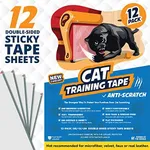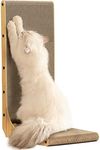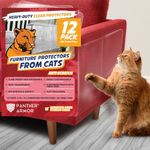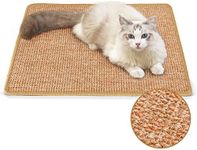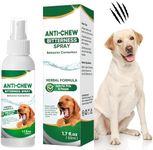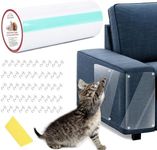Buying Guide for the Best Cat Scratch Spray
Choosing the right cat scratch spray can make a big difference in protecting your furniture and helping your cat develop good scratching habits. These sprays are designed to deter cats from scratching unwanted areas or to encourage them to use designated scratching posts. When shopping for a cat scratch spray, it's important to consider how effective, safe, and easy to use the product is, as well as how it fits your cat's specific needs and sensitivities.Active IngredientsActive ingredients are the main components in the spray that either deter or attract your cat. Some sprays use natural scents like citrus or herbal oils that cats dislike, while others use pheromones to calm or redirect scratching behavior. It's important because certain ingredients may be more effective for your cat, and some cats may have sensitivities or allergies. When comparing sprays, look for natural, non-toxic ingredients if you have a sensitive cat or children at home. If your cat is not responding to one type, you might need to try a different active ingredient. Your cat’s reaction and any household sensitivities should guide your choice.
Intended Use (Deterrent vs. Attractant)Cat scratch sprays generally fall into two categories: deterrents, which discourage cats from scratching certain areas, and attractants, which encourage them to scratch appropriate places like posts. This is important because using the wrong type can confuse your cat or be ineffective. Deterrents are best if your cat is damaging furniture, while attractants help train your cat to use a scratching post. Think about your goal—whether you want to stop unwanted scratching or encourage good habits—and choose accordingly.
Safety for Pets and HumansSafety refers to how safe the spray is for your cat, other pets, and people in your home. Some sprays contain harsh chemicals that could cause irritation or health issues if ingested or touched. Always check that the spray is labeled as safe for pets and humans, especially if you have young children or other animals. If your cat has a history of allergies or sensitivities, opt for sprays with simple, natural ingredients. Your household’s health needs should always come first.
Scent Strength and ResidueScent strength is how strong the spray smells, and residue refers to any leftover film or marks it might leave on surfaces. A strong scent might be unpleasant for you or your cat, and some sprays can stain or damage furniture. If you’re sensitive to smells or want to use the spray on visible surfaces, look for products with mild scents and non-staining formulas. Consider where you plan to use the spray and how much scent you can tolerate.
Duration of EffectivenessDuration of effectiveness means how long the spray works after being applied. Some sprays need to be reapplied daily, while others last for several days. This is important because frequent reapplication can be inconvenient, especially in busy households. If you want a low-maintenance solution, look for sprays that offer longer-lasting protection. Your schedule and willingness to reapply should help you decide which duration works best for you.
Ease of ApplicationEase of application refers to how simple it is to use the spray. Some bottles have fine misters for even coverage, while others might be harder to control or require more effort. This matters because a spray that’s easy to apply will save you time and ensure you use it consistently. If you plan to treat large areas or multiple surfaces, look for a spray with a user-friendly nozzle. Your comfort with the application process should guide your choice.

